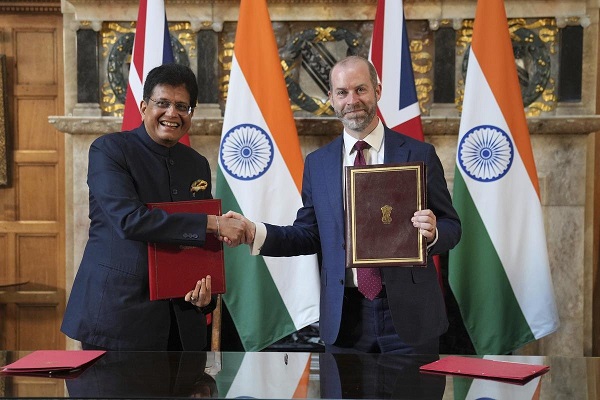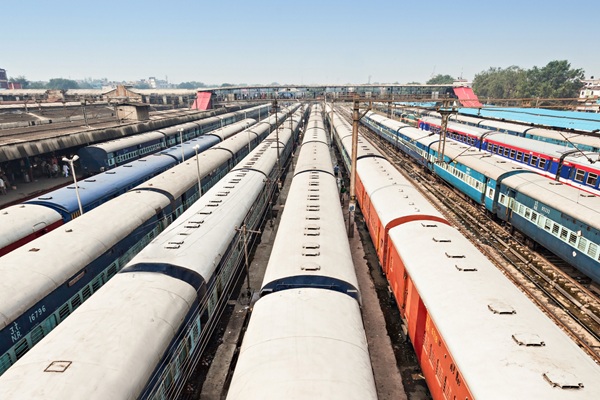.png)
Did India Concede Future Flexibility in the India-UK Trade Deal?
The forward review mechanism clause in the India-UK FTA, linking India’s future policy to consultation rights for the UK, could constrain New Delhi’s flexibility in future negotiations with partners like the EU and the US.


Shweta Kushe is an Assistant Manager with the Global Trade Advisory vertical at Deloitte Touche Tohmatsu India LLP.
October 31, 2025 at 6:33 AM IST
India and the United Kingdom have claimed that the Comprehensive Economic and Trade Agreement signed between the two countries is significant to their economies, yet the fine print warrants closer examination. One of its unique features is a clause that appears in different parts of the agreement but is explicitly named only in the Digital Trade Chapter: the forward review mechanism.
Unlike standard review clauses, which are typically time-bound, the forward review mechanism is triggered by a party’s future commitments to a third party or by changes in its domestic legislation. It is likely a first in India’s trade policy landscape. This provision, modest at first glance, could cast a long shadow over India’s ongoing trade agreement negotiations with major partners such as the European Union, the US, and Australia.
The Fine Print
The forward review mechanism, as set out in Article 12.20 of the India-UK FTA’s Digital Trade Chapter, allows either party to initiate consultations if the other, in a future agreement with a third party, adopts more liberal commitments on specific digital trade disciplines, namely, cross-border data flows, localisation of computing facilities, or source code disclosure. This marks a departure from standard review clauses, which are typically structured around periodic mutual assessments or built-in timelines. Interestingly, the forward review mechanism is included in the India-UK FTA in addition to a standard five-year review clause. This indicates a deliberate layering of treaty architecture that blends routine oversight with conditional consultation rights. Clauses designed similar in design to the forward review mechanism appear in multiple chapters elsewhere in the agreement.
For instance, in the Intellectual Property Chapter, Article 13.69 includes a trigger for consultations if India alone legislatively extends its term of copyright protection or commits to such an extension in a future agreement with a third party. Similarly, in the Government Procurement Chapter, Article 15.22 requires India to notify and consult with the UK before extending greater market access, lowering thresholds, or offering other procurement advantages to another partner.
Taken together, these provisions reveal a recurring structural theme: the embedding of conditional consultation mechanisms that do not automatically confer most-favoured-nation benefits, yet institutionalise the right to seek them. Only Chapter 12 carries the formal label of a ‘forward review mechanism,’ but its logic reverberates throughout the agreement, setting a clear precedent.
So, why this deserves attention?
India’s existing FTAs, including those signed with the UAE, MERCOSUR, and EFTA, do not contain any such mechanism that ties future treaty-making to consultation rights. Before the India–UK FTA, especially in areas such as intellectual property, digital trade, and government procurement, India had largely steered clear of making forward-looking procedural commitments. Moreover, it offered no foothold for partners to monitor or leverage its future negotiations with third countries. Prima facie, the inclusion of these clauses suggests a tacit acknowledgment by India of the limited convergence between its domestic regulatory framework and the evolving global trade regime.
Any trade agreement is premised on the foundation of symmetry and reciprocity. A forward review mechanism that selectively scrutinises only India’s future conduct, as is the case in Intellectual Property and Government Procurement chapters, introduces a structural asymmetry. Granting one party the exclusive right to initiate consultations for upward alignment, regardless of the distinct policy context in which India may have acted in negotiations with a third party, risks setting a precedent that could prove difficult to contain in future negotiations. Such clauses introduce a degree of treaty elasticity and risk making India's regulatory choices the first tile in a broader game of dominoes, where one concession to a third-party may trigger a cascade of unintended renegotiations. For India, which is simultaneously engaged in FTA negotiations with major partners such as the EU and the US, the decision to accept this clause in the India-UK FTA is not without consequence. To illustrate, reports suggest that the EU has been urging India to adopt GDPR-aligned data protection standards as a prerequisite for concluding the India-EU Free Trade Agreement. Given that the EU is unlikely to sign an FTA without such commitments on data flows, the forward review mechanism in the India-UK FTA effectively enables the UK to capitalise on any future digital liberalisation that India extends to the EU.
An isolated instance?
There is no denying that the India–UK FTA is a product of an increasingly fluid and volatile trade landscape, where supply chains fracture overnight, tariffs are announced in 280 characters, and global economic emergencies routinely override institutional predictability. In such a world, the instinct to embed dynamic mechanisms into trade agreements is understandable. The forward review mechanism, in that sense, is not entirely novel - it is old wine in new bottles, a reinvention of traditional soft safeguards to navigate an increasingly uncertain global order. Yet, this wine bottle seems to be poured generously into one party’s glass.
It is evident that the mechanism has been deployed narrowly in the India-UK FTA. If the intent was to anticipate future challenges, the Environment Chapter could have included a forward review clause to mitigate the UK’s proposed Carbon Border Adjustment Mechanism or at least have allowed India to seek consultations for transitional relief or technical carve-outs. That is conspicuously absent. It demonstrates that the forward review mechanism has not been used as a broad governance tool across, but rather as a targeted instrument in areas where India is expected to evolve or liberalise in alignment with Global North regimes.
The question, therefore, is not whether forward review mechanisms belong in modern FTAs - they do. The real question is whether they should be designed to lean disproportionately on the conduct of one party alone. As India pursues negotiations with the European Union, the US, and other major Western trade partners, this new tool in India’s treaty toolkit deserves closer scrutiny. The risk here is not merely of prematurely committing to future alignments, but of creating a dynamic where each future step could compel India to justify its sovereign decisions and return to the negotiating table, particularly in emerging issues where harmonisation may be neither strategic nor in its best interest.
* The views expressed in this article belong to the author and do not reflect the views of the firm or affiliated entities.



